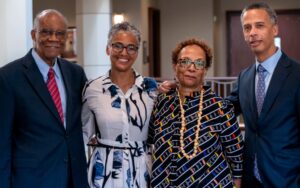
The University of Maryland Francis King Carey School of Law on Monday announced its new Gibson-Banks Center for Race and the Law, a hub that will offer education, advocacy and research aimed at advancing racial justice.
The new center is named after Larry Gibson and Taunya Lovell Banks, both Maryland Carey Law professors and civil rights trailblazers.
The center’s focus will be improving the lives of people affected by historic and modern-day racial oppression, the law school said in a news release. These efforts will include partnering with impacted communities and organizations that work for racial justice in order to address inequalities in the legal system, employment, education, housing and health, among other issues.
Renée M. Hutchins, the law school’s dean, said the center will offer “a critical space for scholarship, engagement, and action on issues of race and the law. It will also serve as a resource for students, lawyers, and community members who are working to advance racial justice.
“The beauty of this center is that it will be a convener of all the relevant voices so we can get to the best solutions,” Hutchins said.
Michael Pinard, a professor at Maryland Carey Law and expert on race and criminal justice issues, will lead the center as its first faculty director.
“I am honored to direct the Gibson-Banks Center for Race and the Law,” Pinard said. “The Center’s overall focus and vision is to work with community stakeholders to improve the lives of those harmed by historical and modern-day racial and intersectional oppression.”
The creation of the center was announced at the law school’s fifth Black Law Alumni Reunion, which is held every five years.
The center’s programming will include courses, workshops and discussions for Maryland Carey Law students, University System of Maryland institutions and the public, the school said.
The center will also participate in advocacy work, including state and federal litigation, seeking legislative change at all levels of government, and writing amicus briefs on important cases. Law school faculty and center fellows will also participate in legal scholarship related to race and intersectionality as well as policy and evidence-based research, the school said.
Carey Law alumnus William H. “Billy” Murphy, a graduate of the class of 1969, has committed $1 million to help build the center.
The center also will examine Maryland Carey Law’s legacy as a formerly segregated institution that began enrolling Black students following litigation led by Thurgood Marshall, who went on to become the first African-American justice on the U.S. Supreme Court.
Gibson, one of the professors for whom the center is named, is a legal historian who wrote a biography of Marshall and has a second book about the justice coming soon. He has been a member of the Carey Law faculty since 1974; before that, he became the first African-American law professor at the University of Virginia, according to his faculty profile.
Banks, the other professor for whom the Center is named, is a professor emeritus who taught her last class at Carey Law in the fall of 2021. She is known for her work in critical race theory and was the first tenured Black woman on the law school’s faculty.
g
This post was originally published on this site be sure to check out more of their content.






